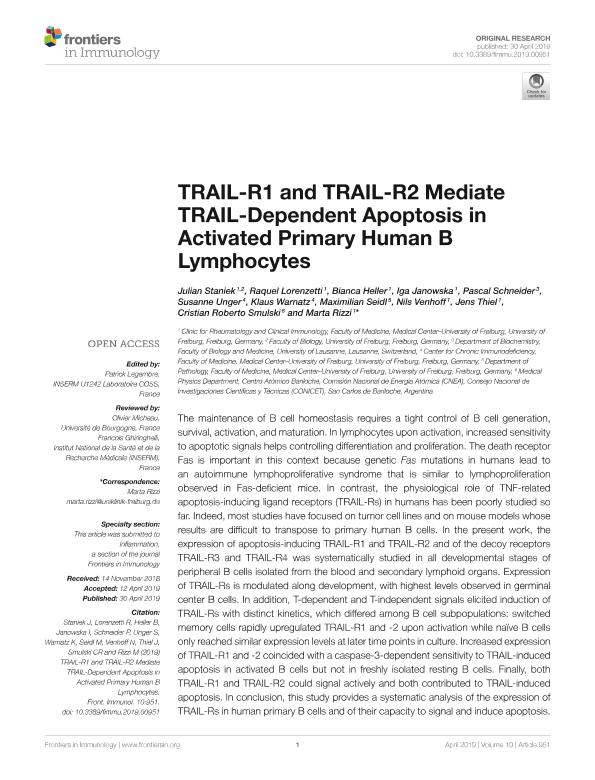Mostrar el registro sencillo del ítem
dc.contributor.author
Staniek, Julian
dc.contributor.author
Lorenzetti, Raquel
dc.contributor.author
Heller, Bianca
dc.contributor.author
Janowska, Iga
dc.contributor.author
Schneider, Pascal
dc.contributor.author
Unger, Susanne
dc.contributor.author
Warnatz, Klaus
dc.contributor.author
Seidl, Maximilian
dc.contributor.author
Venhoff, Nils
dc.contributor.author
Thiel, Jens
dc.contributor.author
Smulski, Cristian Roberto

dc.contributor.author
Rizzi, Marta
dc.date.available
2022-10-26T12:37:33Z
dc.date.issued
2019-04
dc.identifier.citation
Staniek, Julian; Lorenzetti, Raquel; Heller, Bianca; Janowska, Iga; Schneider, Pascal; et al.; TRAIL-R1 and TRAIL-R2 mediate TRAIL-dependent apoptosis in activated primary human B lymphocytes; Frontiers Media; Frontiers in Immunology; 10; 4-2019; 1-13
dc.identifier.uri
http://hdl.handle.net/11336/174901
dc.description.abstract
The maintenance of B cell homeostasis requires a tight control of B cell generation, survival, activation, and maturation. In lymphocytes upon activation, increased sensitivity to apoptotic signals helps controlling differentiation and proliferation. The death receptor Fas is important in this context because genetic Fas mutations in humans lead to an autoimmune lymphoproliferative syndrome that is similar to lymphoproliferation observed in Fas-deficient mice. In contrast, the physiological role of TNF-related apoptosis-inducing ligand receptors (TRAIL-Rs) in humans has been poorly studied so far. Indeed, most studies have focused on tumor cell lines and on mouse models whose results are difficult to transpose to primary human B cells. In the present work, the expression of apoptosis-inducing TRAIL-R1 and TRAIL-R2 and of the decoy receptors TRAIL-R3 and TRAIL-R4 was systematically studied in all developmental stages of peripheral B cells isolated from the blood and secondary lymphoid organs. Expression of TRAIL-Rs is modulated along development, with highest levels observed in germinal center B cells. In addition, T-dependent and T-independent signals elicited induction of TRAIL-Rs with distinct kinetics, which differed among B cell subpopulations: switched memory cells rapidly upregulated TRAIL-R1 and -2 upon activation while naïve B cells only reached similar expression levels at later time points in culture. Increased expression of TRAIL-R1 and -2 coincided with a caspase-3-dependent sensitivity to TRAIL-induced apoptosis in activated B cells but not in freshly isolated resting B cells. Finally, both TRAIL-R1 and TRAIL-R2 could signal actively and both contributed to TRAIL-induced apoptosis. In conclusion, this study provides a systematic analysis of the expression of TRAIL-Rs in human primary B cells and of their capacity to signal and induce apoptosis. This dataset forms a basis to further study and understand the dysregulation of TRAIL-Rs and TRAIL expression observed in autoimmune diseases. Additionally, it will be important to foresee potential bystander immunomodulation when TRAIL-R agonists are used in cancer treatment.
dc.format
application/pdf
dc.language.iso
eng
dc.publisher
Frontiers Media

dc.rights
info:eu-repo/semantics/openAccess
dc.rights.uri
https://creativecommons.org/licenses/by/2.5/ar/
dc.subject
APOPTOSIS
dc.subject
B LYMPHOCYTES
dc.subject
HUMAN
dc.subject
TRAIL
dc.subject
TRAIL-R
dc.subject.classification
Otras Ciencias Biológicas

dc.subject.classification
Ciencias Biológicas

dc.subject.classification
CIENCIAS NATURALES Y EXACTAS

dc.title
TRAIL-R1 and TRAIL-R2 mediate TRAIL-dependent apoptosis in activated primary human B lymphocytes
dc.type
info:eu-repo/semantics/article
dc.type
info:ar-repo/semantics/artículo
dc.type
info:eu-repo/semantics/publishedVersion
dc.date.updated
2022-10-25T14:38:59Z
dc.identifier.eissn
1664-3224
dc.journal.volume
10
dc.journal.pagination
1-13
dc.journal.pais
Suiza

dc.description.fil
Fil: Staniek, Julian. Albert Ludwigs University of Freiburg; Alemania
dc.description.fil
Fil: Lorenzetti, Raquel. Albert Ludwigs University of Freiburg; Alemania
dc.description.fil
Fil: Heller, Bianca. Albert Ludwigs University of Freiburg; Alemania
dc.description.fil
Fil: Janowska, Iga. Albert Ludwigs University of Freiburg; Alemania
dc.description.fil
Fil: Schneider, Pascal. Universite de Lausanne; Suiza
dc.description.fil
Fil: Unger, Susanne. Albert Ludwigs University of Freiburg; Alemania
dc.description.fil
Fil: Warnatz, Klaus. Albert Ludwigs University of Freiburg; Alemania
dc.description.fil
Fil: Seidl, Maximilian. Albert Ludwigs University of Freiburg; Alemania
dc.description.fil
Fil: Venhoff, Nils. Albert Ludwigs University of Freiburg; Alemania
dc.description.fil
Fil: Thiel, Jens. Albert Ludwigs University of Freiburg; Alemania
dc.description.fil
Fil: Smulski, Cristian Roberto. Comisión Nacional de Energía Atómica. Centro Atómico Bariloche; Argentina. Consejo Nacional de Investigaciones Científicas y Técnicas. Centro Científico Tecnológico Conicet - Patagonia Norte; Argentina
dc.description.fil
Fil: Rizzi, Marta. Albert Ludwigs University of Freiburg; Alemania
dc.journal.title
Frontiers in Immunology
dc.relation.alternativeid
info:eu-repo/semantics/altIdentifier/url/https://www.frontiersin.org/article/10.3389/fimmu.2019.00951/full
dc.relation.alternativeid
info:eu-repo/semantics/altIdentifier/doi/http://dx.doi.org/10.3389/fimmu.2019.00951
Archivos asociados
